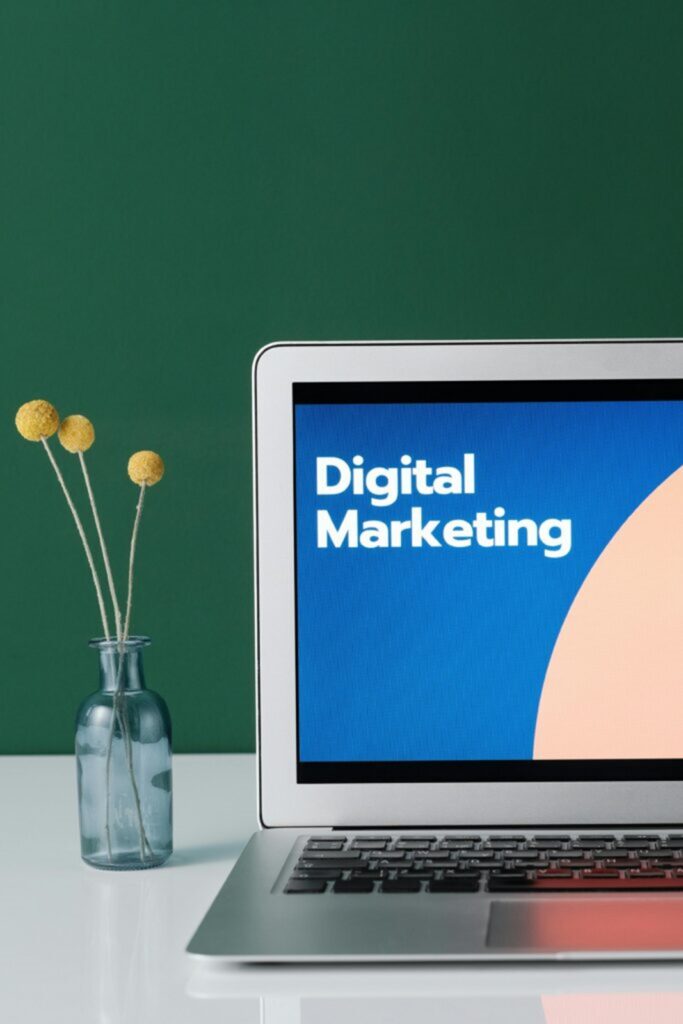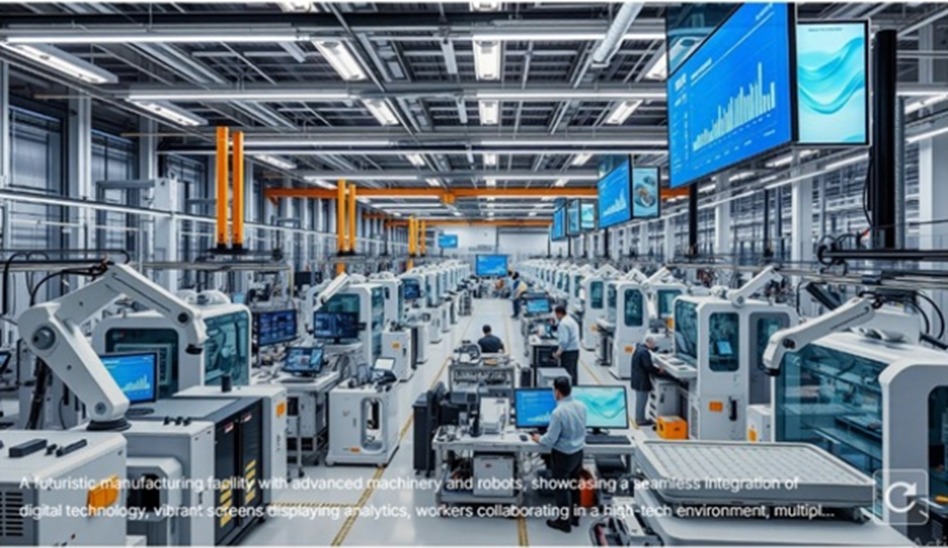Table of Contents
ToggleDigital Marketing’s Impact on Manufacturing: 10 Secret Ways
Top 10 Secret Ways How Digital Marketing is adding value to manufacturing industry
The manufacturing world is changing fast, thanks to digital marketing. This change is making businesses grow and work better. It’s also helping them stay ahead of their rivals.

This article explores how digital marketing is changing the manufacturing world. It shows how it improves production and customer service. We’ll look at the 10 secret ways digital marketing boosts the manufacturing sector.

A futuristic manufacturing facility with advanced machinery and robots, showcasing a seamless integration of digital technology, vibrant screens displaying analytics, workers collaborating in a high-tech environment, multiple production lines, and a clean, organized layout illuminated by bright LED lights.
Key Takeaways
- Digital marketing is revolutionizing the manufacturing industry, offering innovative solutions to drive growth and efficiency.
- Manufacturers are leveraging digital strategies to enhance customer relationships, optimize production, and increase supply chain visibility.
- Social media, content marketing, and search engine optimization are crucial components of a successful digital marketing approach for manufacturers.
- Data-driven decision making and advanced analytics are enabling manufacturers to make informed, strategic choices to improve their operations.
- The future of manufacturing digital marketing lies in the integration of emerging technologies and a commitment to continuous digital evolution.
.
Understanding Digital Transformation in Modern Manufacturing
The manufacturing world is changing fast, thanks to Industry 4.0 and new digital tech. This change is making factories smarter, more efficient, and better at meeting customer needs.
Evolution of Industry 4.0 and Digital Integration
Industry 4.0, or the fourth industrial revolution, combines physical and digital systems. It uses IoT, AI, and automation to change how things are made. This makes companies more efficient and better at using digital tools.
Key Digital Technologies Reshaping Manufacturing
- The Internet of Things (IoT) connects machines and systems. It helps collect and analyze data in real-time to improve production.
- Artificial Intelligence (AI) and advanced analytics change how decisions are made. They help with predictive maintenance, quality control, and supply chain management.
- Robotics and Automation boost productivity, precision, and safety. They help create smart factories.
Current Manufacturing Marketing Challenges
The digital shift in manufacturing brings new marketing challenges. Companies need to adjust their strategies to meet the needs of tech-savvy customers. They must use data to improve their products and services.
|
Digital Technology |
Impact on Manufacturing |
|
Internet of Things (IoT) |
Enables real-time data collection and analysis for optimization |
|
Artificial Intelligence (AI) |
Transforms decision-making processes and enhances operational efficiency |
|
Robotics and Automation |
Increases productivity, precision, and safety in smart factories |
Digital Marketing
Data-Driven Decision Making in Manufacturing Marketing
In today’s world, big data analytics and predictive analytics are key for making smart marketing choices. They help manufacturers understand customer behavior, market trends, and how to improve production. This leads to better data-driven marketing plans.
Big data analytics uncovers important customer insights. It looks at sales, feedback, and social media to find patterns. This helps manufacturers know what customers want and how to improve their products and marketing.
- Predictive analytics lets manufacturers guess market trends and what customers will need. This way, they can change their marketing plans and stay ahead.
- With data insights, companies can make their marketing better. They can use their resources wisely and talk to the right people with messages that matter.
- Using data-driven marketing in manufacturing makes things more efficient. It also makes customers happier and helps the business do better overall.
The digital change is big for manufacturing. Using big data analytics and predictive analytics wisely is key. It helps manufacturers stay competitive and find new chances in the market.
Understanding Digital Transformation in Modern Manufacturing
The manufacturing world is changing fast, thanks to Industry 4.0 and new digital tech. This change is making factories smarter, more efficient, and better at meeting customer needs.
Evolution of Industry 4.0 and Digital Integration
Industry 4.0, or the fourth industrial revolution, combines physical and digital systems. It uses IoT, AI, and automation to change how things are made. This makes companies more efficient and better at using digital tools.
Key Digital Technologies Reshaping Manufacturing
- The Internet of Things (IoT) connects machines and systems. It helps collect and analyze data in real-time to improve production.
- Artificial Intelligence (AI) and advanced analytics change how decisions are made. They help with predictive maintenance, quality control, and supply chain management.
- Robotics and Automation boost productivity, precision, and safety. They help create smart factories.
Current Manufacturing Marketing Challenges
The digital shift in manufacturing brings new marketing challenges. Companies need to adjust their strategies to meet the needs of tech-savvy customers. They must use data to improve their products and services.
|
Digital Technology |
Impact on Manufacturing |
|
Internet of Things (IoT) |
Enables real-time data collection and analysis for optimization |
|
Artificial Intelligence (AI) |
Transforms decision-making processes and enhances operational efficiency |
|
Robotics and Automation |
Increases productivity, precision, and safety in smart factories |
Digital Marketing
Data-Driven Decision Making in Manufacturing Marketing
In today’s world, big data analytics and predictive analytics are key for making smart marketing choices. They help manufacturers understand customer behavior, market trends, and how to improve production. This leads to better data-driven marketing plans.
Big data analytics uncovers important customer insights. It looks at sales, feedback, and social media to find patterns. This helps manufacturers know what customers want and how to improve their products and marketing.
- Predictive analytics lets manufacturers guess market trends and what customers will need. This way, they can change their marketing plans and stay ahead.
- With data insights, companies can make their marketing better. They can use their resources wisely and talk to the right people with messages that matter.
- Using data-driven marketing in manufacturing makes things more efficient. It also makes customers happier and helps the business do better overall.
The digital change is big for manufacturing. Using big data analytics and predictive analytics wisely is key. It helps manufacturers stay competitive and find new chances in the market.
10 Secret Ways How Digital Marketing is adding value to manufacturing industry
The manufacturing sector has seen big changes with digital technologies. Digital marketing is a key tool that adds great value. It changes how companies interact with customers, makes production better, and makes supply chains clearer. Let’s look at 10 secret ways digital marketing is changing the manufacturing world.
Reshaping Customer Relationships
Digital marketing helps manufacturers connect better with customers. Customer relationship management strategies, like emails and social media, help understand what customers want. This leads to happier customers and more loyalty.
Optimizing Production Processes
Digital marketing gives insights to improve production optimization. By looking at customer data and feedback, manufacturers can spot problems and make things better. They can also create new products that meet market needs.
Enhancing Supply Chain Transparency
Digital marketing tools, like online dashboards and analytics, make supply chain transparency better. They let manufacturers see inventory, shipments, and supply chain data in real-time. This helps make smart decisions, cut waste, and adapt to market changes fast.
- Improved customer segmentation and targeted marketing campaigns
- Enhanced brand awareness and online reputation management
- Data-driven decision making for product development and innovation
- Automated marketing workflows for greater efficiency
- Increased lead generation and conversion rates through digital channels
By using digital marketing, manufacturers can grow, build stronger customer ties, improve production, and make supply chains clearer. This leads to lasting success in the changing manufacturing world.
Social Media’s Role in Manufacturing Brand Building
Social media is key for manufacturing companies to build their brand. It helps them show off new products and connect with customers. Platforms like LinkedIn are crucial for their marketing.
The growth of B2B social media marketing has changed how companies talk to their audience. Using LinkedIn, they can share their knowledge and build trust. This boosts their brand and engagement.
Unlocking the Potential of LinkedIn for Manufacturing
LinkedIn is the top professional network for manufacturers. It lets them connect with others in their field, share what they offer, and reach a specific audience. With a strong LinkedIn presence, manufacturers can:
- Show their expertise and innovation through interesting content
- Grow relationships with customers and find new ones through networking
- Use analytics to understand what their audience likes
- Work with influencers to increase their brand’s visibility
By using social media, especially LinkedIn, manufacturers can build a strong brand. This brand connects with their B2B audience, leading to growth and success.

A modern manufacturing facility with diverse professionals engaging in discussions, using digital devices and collaborating on projects, surrounded by machinery and industrial elements, with a subtle digital interface theme in the background, emphasizing connectivity and innovation.
Content Marketing Strategies for Manufacturing Companies
Manufacturing companies are now seeing the big benefits of content marketing. It helps them connect with customers and boost their brand. By making smart content plans, they can reach their audience and show off their skills. This leads to more sales and a stronger market spot.
Creating Technical Content That Converts
Manufacturers need to share detailed, accurate content that speaks to their audience. This could be through blog posts, whitepapers, or guides. These pieces dive into the details of their products and services, and the latest trends in their field. By sharing valuable info and solving customer problems, they become industry leaders and gain trust.
Video Marketing for Product Demonstrations
Video marketing is key in today’s visual world. Video product demos give a hands-on look at what products can do. They grab the attention of potential buyers and push them towards making a purchase.
Case Studies and Success Stories
Manufacturing case studies are a strong proof of success. They show how a company’s solutions have helped others. By sharing the challenges, strategies, and results, manufacturers prove their worth. This makes potential customers more likely to choose them.
|
Content Marketing Strategy |
Description |
Benefits |
|
Technical content marketing |
Develop in-depth, informative content that addresses technical aspects of products and industry trends |
Establishes thought leadership, builds trust, and educates customers |
|
Video product demos |
Leverage video marketing to showcase product features and benefits in an engaging, interactive format |
Enhances customer understanding, increases product awareness, and drives conversions |
|
Manufacturing case studies |
Highlight successful client partnerships and the impact of a company’s solutions |
Provides social proof, demonstrates capabilities, and encourages potential customers to consider the offering |
Search Engine Optimization for Manufacturing Websites
In today’s digital world, having a strong online presence is key for manufacturing companies to compete. Industrial SEO helps improve your website’s visibility and ranking on search engines. This is crucial for reaching more people.
Manufacturing keyword research is the base of good SEO for manufacturing sites. It finds the keywords your audience uses. This way, your site can match their searches better, bringing in more relevant visitors.
Local SEO for manufacturers is also vital. Many people look for local services and products. By optimizing for local search, you can attract more customers in your area. This boosts your site’s local search rankings.
|
SEO Tactic |
Benefits |
Key Considerations |
|
Keyword Research |
Identify industry-specific keywords Optimize content and metadata Improve search visibility |
Focus on long-tail, technical keywords Analyze competitor keyword strategies Continuously refine and update keywords |
|
Local SEO |
Target local customers Improve local search rankings Increase visibility in Google Maps |
Claim and optimize Google Business Profile Ensure NAP (name, address, phone) consistency Encourage customer reviews and ratings |
|
Technical Optimization |
Improve website speed and performance Ensure mobile-friendliness Enhance site structure and navigation |
Conduct regular site audits Optimize images, videos, and other media Implement structured data and schema |
With a solid industrial SEO plan, manufacturing companies can boost their online presence. This attracts more qualified leads, leading to greater success online.

A futuristic industrial setting with a large manufacturing facility in the background, integrated circuit patterns overlaying machinery, digital analytics graphs blending into conveyor belts, gears and cogs with glowing connectivity lines, a robotic arm interacting with holographic SEO elements, vibrant colors showcasing technology and innovation in manufacturing.
Email Marketing
Email Marketing is the use of email to Promote products or services, Email Marketing Revenue is projected to grow 287 percent worldwild from 2024 to 2032.
Email Marketing and Lead Nurturing in Manufacturing
In today’s digital world, B2B email marketing and lead nurturing automation are key for manufacturers. These tools help businesses connect with their audience, grow leads, and increase sales.
Building Targeted Email Lists
Creating a strong B2B email marketing list is crucial. Manufacturers should gather info from leads, potential buyers, and current clients. Using opt-in forms, lead magnets, and partnerships can improve the list’s quality and size.
Automation Advantages
Automation Advantages Increased productivity,Improved accuracy and quality and Increased safety
Automation and Personalization Techniques
For better email marketing, manufacturers should use lead nurturing automation and personalized email campaigns. Automated systems send timely, relevant messages. Personalization, like dynamic content and segmentation, makes each email unique and engaging.
By using B2B email marketing, lead nurturing automation, and personalized email campaigns, manufacturers can strengthen their audience ties. This leads to more qualified leads and better marketing results.
Digital Marketing Analytics and ROI Measurement
In the manufacturing world, every dollar counts. It’s crucial to understand the value of your digital marketing. Digital analytics helps you see how well your online ads perform. This lets you make smart choices to maximize your marketing return.
Tracking website traffic is essential. Website analytics show which ads attract the most visitors. They also reveal how long people stay and what they like. This info helps you spend your marketing ROI wisely, focusing on what works best.
|
Metric |
Description |
Importance for Manufacturing |
|
Website Traffic |
The number of visitors to your website and their engagement levels. |
Helps identify the most effective marketing channels and content for driving qualified leads. |
|
Lead Generation |
The number of potential customers who have submitted their contact information. |
Allows you to measure the success of your lead nurturing and conversion efforts. |
|
Sales Conversion Rate |
The percentage of leads that ultimately become paying customers. |
Provides insights into the effectiveness of your sales funnel and marketing-sales alignment. |
|
Return on Ad Spend (ROAS) |
The revenue generated for every dollar spent on advertising. |
Helps optimize your ad budget and identify the most profitable digital marketing channels. |
With digital analytics for manufacturing, you can find key insights. These insights help you make better choices and improve your marketing. This leads to lasting growth and better marketing ROI.
Future Trends in Manufacturing Digital Marketing
The manufacturing industry is changing fast, and digital marketing is at the forefront of these changes. New technologies and the need to keep up with digital trends are shaping the future. This landscape is set for big transformations.
Emerging Technologies and Marketing Integration
AI in marketing is changing how manufacturers reach out to customers. With predictive analytics, chatbots, and personalized product suggestions, they can offer better experiences. They can also guess what customers might want next.
VR/AR in manufacturing is also making a big impact. It improves how products are shown and how customers interact with them. It also gives manufacturers valuable data to improve their marketing.
Preparing for Digital Evolution
- Put the customer first: Manufacturers need to understand what their customers want and need to stay ahead.
- Use data to make smart choices: Data-driven insights are key for making the best digital marketing decisions.
- Stay open to new ideas: A culture of learning and adapting is essential for success in digital marketing.
- Work with digital marketing experts: Partnering with pros keeps manufacturers up-to-date with the latest trends.
As the manufacturing industry goes digital, embracing new technologies and staying ready for change is crucial. This will help them stay competitive and give customers the best experiences.
|
Emerging Technology |
Impact on Manufacturing Digital Marketing |
|
AI in Marketing |
Predictive analytics, intelligent chatbots, personalized product recommendations |
|
VR/AR in Manufacturing |
Enhanced product visualization, customer engagement, and data-driven insights |
Implementing Digital Marketing in Your Manufacturing Business
Entering the digital world can seem overwhelming for many manufacturing companies. But, with a solid digital marketing strategy, you can open up new possibilities. It’s important to approach digital change with a strategic plan. This involves using the latest technologies and data to improve your operations.
Start by reviewing your current marketing efforts. Look for where digital marketing can make a big difference. This could be in reaching new customers, improving production, or making your supply chain more visible. Knowing this will help you plan your change management efforts.
- Create a clear digital marketing strategythat matches your business goals. It should have specific targets, measurable KPIs, and a detailed plan.
- Choose the right digital tools and technologies for your marketing. Tools like social media and data analytics can help you make smarter choices and get better results.
- Focus on your customers, using digital channels to connect with them. This could mean personalized content, targeted emails, and active social media.
- Keep an eye on how your digital marketing is doing. Check your progress often, tweak your plans as needed, and stay flexible with changing trends.
Successful digital transformation in manufacturing needs a complete and flexible approach. By using a thorough digital marketing strategy, you can set your business up for success. And you’ll stay ahead in the constantly changing digital world.
Conclusion
In today’s fast-changing manufacturing world, using digital marketing is key to staying ahead. This article has shown how digital marketing helps the manufacturing industry grow and stay competitive.
Using data to make decisions can improve production and supply chains. It also helps build stronger customer ties. Social media, content marketing, and SEO are great for getting your brand noticed and connecting with more people.
The future of digital marketing in manufacturing is exciting. It will blend new tech and changing customer needs. To keep up, manufacturers must be open to change, innovation, and investing in digital growth. This way, they can work better, be more productive, and stand out globally.
FAQ
What is the impact of digital marketing on the manufacturing industry?
Digital marketing has changed the manufacturing world a lot. It has made operations better, improved customer relationships, and helped businesses grow. New digital strategies are changing how manufacturers talk to their audience, make things better, and see their supply chains.
How is Industry 4.0 and digital integration changing manufacturing?
Industry 4.0 and digital integration have big effects on making things. Technologies like the Internet of Things (IoT), artificial intelligence (AI), and robotics are making factories smarter. This change brings new chances and challenges for marketing in the manufacturing world.
How can manufacturers leverage data-driven decision making in their marketing efforts?
Manufacturers are using big data and predictive insights to make smart marketing choices. This helps them understand customers better, predict market trends, and improve their products and marketing plans.
What are the key ways digital marketing is adding value to the manufacturing industry?
Digital marketing is helping the manufacturing industry in many ways. It’s changing how companies talk to customers, making production better with data, and making supply chains clearer with digital tools.
How can social media be leveraged for manufacturing brand building?
Social media, especially LinkedIn, is key for building a strong brand for manufacturers. By sharing technical content, product demos, and success stories, companies can connect with their audience and show their expertise.
What content marketing strategies are effective for manufacturing companies?
Effective content marketing for manufacturers includes: – Making interesting technical content to educate and attract customers – Using videos for product demos and learning – Sharing success stories and case studies to build trust
How can manufacturers optimize their websites for search engine visibility?
To get more online visibility, manufacturers should use SEO. This means finding the right keywords, optimizing for local searches, and making their website better for search engines.
What email marketing and lead nurturing strategies are effective in the manufacturing industry?
Good email marketing and lead nurturing for manufacturers include: – Building targeted email lists – Using automation and personalization to boost engagement – Creating campaigns that offer value and build long-term relationships
How can manufacturers measure the ROI of their digital marketing efforts?
To see if digital marketing is working, manufacturers should track important metrics and use digital analytics tools. They can check website traffic, lead generation, customer engagement, and sales to see how well their campaigns are doing.
What are the future trends in manufacturing digital marketing?
Future trends in manufacturing digital marketing include using advanced technologies like AI and VR/AR. Manufacturers need to get ready for these changes by planning a digital transformation roadmap and managing the challenges of change within their teams.
